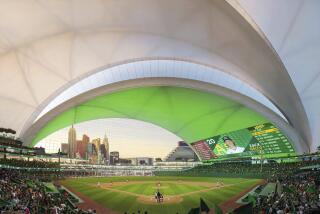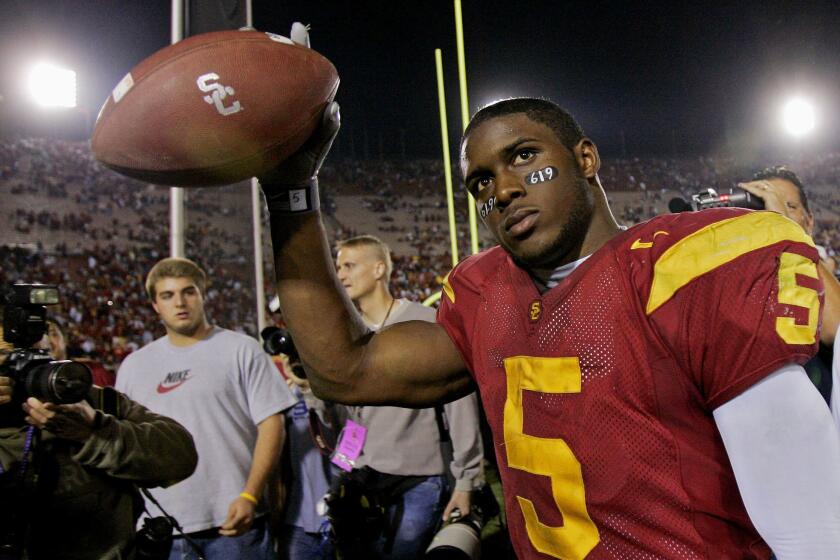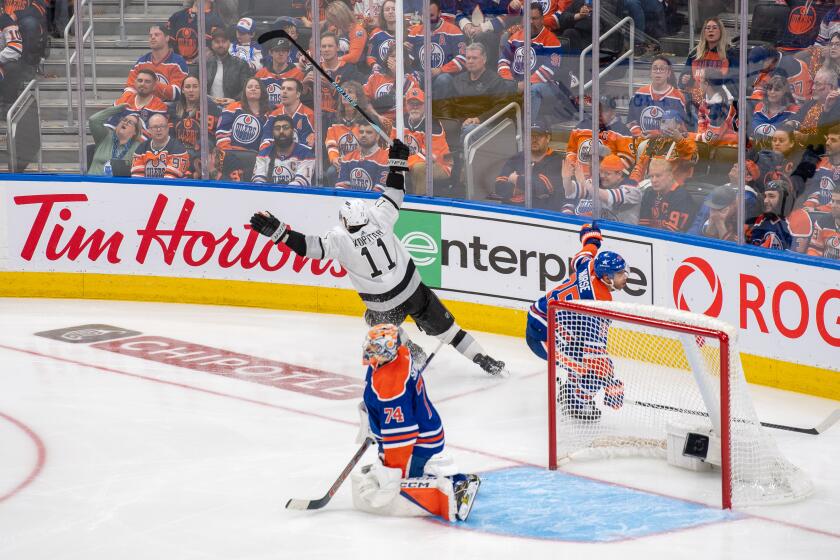What’s in a name? For AEG’s proposed L.A. stadium and corporate patron Farmers Insurance, it could go either way
The Super Bowl will be played Sunday in Arlington, Texas, in a stadium without a corporate name. The World Series was played in that city last fall, in a ballpark without a corporate name.
The race to sell the name of every sports facility in America has slowed in recent years, and not just because of a slumping economy in Texas. But big-bucks naming rights for big-time sports venues have come back, at least for a day, with Farmers Insurance set to announce Tuesday a $700-million agreement to put its name on AEG’s proposed downtown football stadium.
Farmers has been in business since 1928, which should help ease any concern that its name could be as temporary as a raft of other corporate stadium names.
The San Francisco Giants have played in Pac Bell Park, SBC Park and AT&T Park within a decade; the Miami Dolphins have played in a stadium successively named after an owner, an underwear brand, the team mascot, a beer and an insurance company.
As teams have balanced the need for cash against the need to partner with a stable corporate citizen — Enron Field is no longer — companies have grappled with how to justify spending millions on naming rights during a recession.
“They ask, ‘If we’re laying people off, is this something we want to be part of?’” said Bob Wagner, formerly the Ducks’ chief marketing officer. Wagner negotiated the deal to name the Ducks’ arena as the Honda Center and, previously, as the Arrowhead Pond. He also negotiated the Edison Field agreement for the Angels.
“Once you cut the ribbon, you have to have a business plan behind it,” Wagner said.
The deals vary so greatly — by dollars, by market size, by venue size, by what special events take place in the facility — that it would be difficult to devise a uniform way for a business to measure the success of a naming-rights agreement, said David Carter, executive director of the USC Sports Business Institute.
“If Farmers does a deal for $700 million, that doesn’t make it better or worse than somebody who does a $5-million deal in Sacramento,” Carter said.
AEG President Tim Leiweke said Farmers would not have done the deal if the proposed stadium would be used only for NFL games.
“They love the convention aspect of this,” Leiweke said, “and the aspect of [possible] Final Fours is huge within their company.
“If this was just a stand-alone football deal . . . they don’t do it.”
Naming-rights deals have evolved from simple “Your Name Here Arena” contracts to complex packages that include luxury suites for business use, advertising signs in the facility, commercials on team broadcasts, promotions for ticket holders and display space for new products at the venue.
Honda, for instance, did not need to slap its name on an arena in Anaheim to let the world know about its cars.
“We don’t have much of a problem with brand awareness,” said Honda brand manager Tom Peyton.
American Honda has its headquarters in Torrance, and the company enjoys supporting a local team, Peyton said. But he also said the Honda Center deal has had a “positive impact” on company finances — measured in part, he said, by increased car sales to Ducks season-ticket holders.
“It’s been a win-win deal for us,” Peyton said.
Southern California Edison did not have a similar experience with the Angels. The utility company agreed to put its name on the Angels’ ballpark starting in 1998, then canceled the deal after the 2003 season — one year after the team’s unexpected championship had triggered higher payments from Edison to the team.
“The cost, particularly following the wonderful World Series win, had simply become greater than was sensible for our business to carry,” according to an internal Edison e-mail sent to employees at the time.
Still, a championship event enables a company to see and hear its name in sports coverage across the United States and around the world.
Honda got its name on the Anaheim arena in 2006, after Arrowhead declined to renew its agreement. In 2007, the Ducks advanced to the Stanley Cup finals, and won.
“When we played in the Stanley Cup,” Wagner said, “Honda was not upset.”
Times staff writer Sam Farmer contributed to this report.
More to Read
Get our high school sports newsletter
Prep Rally is devoted to the SoCal high school sports experience, bringing you scores, stories and a behind-the-scenes look at what makes prep sports so popular.
You may occasionally receive promotional content from the Los Angeles Times.







